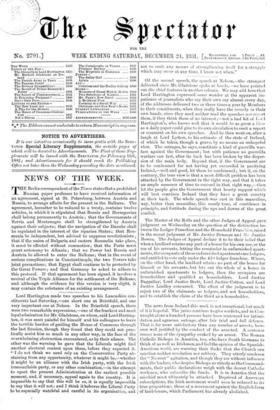Of the second speech, the speech at Nelson,—the strongest delivered
since Mr. Gladstone spoke at Leeds,—we have pointed out the chief features in another column. We may add here that Lord Harlington expressed some wonder at the apparent im- patience of journalists who say their own say almost every day, of the addresses delivered two or three times a year by Members to their constituents, when they really have the remedy in their own hands, since they need neither read the speeches nor report them, if they think them of uo interest ;—not a bad hit of Lord Hartington's, who knows well that it would be as great a blow as a daily paper could give to its own circulation to omit a report or comment on his own speeches. And he then went on, after a laugh at Lord Lytton, to his estimate of the state of Ireland, of which he takes, though a grave, by no means an unhopeful view. The outrages, he says, constitute a kind of guerrilla war- fare against the Government ; but with patience no guerrilla warfare can last, after its back has been broken by the disper- sion of the main body. Beyond that, if the Government are to be condemned for not having yet succeeded in pacifying Ireland,—well and good, let them be condemned ; but if, on the contrary, the true view is that a most difficult problem has been attacked by the Government in the right way, and that it takes an ample measure of time to succeed in that right way,—then let the people give the Government that hearty support which will best convince Ireland that they have a great country at their back. The whole speech was cast in this masculine, nay, better than masculine, this manly tone, of confidence in principle, and fortitude during the ups and downs of the great conflict.






































